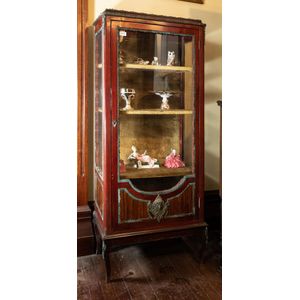Empire-style Ormolu Display Cabinet
faux French Empire style display cabinet. ormolu trimmed, glazed three sides, with olive velvet interior. Height 149 cm, width 64 cm, depth 33 cm
You must be a subscriber, and be logged in to view price and dealer details.
Subscribe Now to view actual auction price for this item
When you subscribe, you have the option of setting the currency in which to display prices to $Au, $US, $NZ or Stg.
This item has been sold, and the description, image and price are for reference purposes only.
- Faux - A French word meaning "false", but when used in decorative arts, the intention is not to deceive, but to simulate the decorative effects of the more expensive material it is imitating. The term " faux bois" meaning "false wood" refers to a furniture item that has been decorated with a marked grain (woodgrain finish) to imitate a more expensive timber.
- Ormolu - Ormolu was popular with French craftsmen in the 18th and 19th century for ornamental fittings for furniture, clocks and other decorative items. True ormolu is gilt bronze, that is bronze that has been coated with gold using a mercury amalgam. Due to the health risks associated with using mercury, this method of creating ormolu was discontinued in France in the 1830s. A substitute was developed consisting of about 75% copper and 25% zinc, however it was inferior to the bronze version. It was often lacquered to prevent it tarnishing.
- Empire Style - The Empire style was a version of neo-classicism popular from 1800 to 1830, coinciding with the rule of Napoleon I from 1840-15. In England the style corrosponds with the Regency style and in the United States to the Federal style.
The style is inspired by classical Rome and Greece, as reflected in the decorative motifs in the the design such as paterae, guilloches, acanthus and swags, and pieces are lavishly decorated with applied gilded decoration.
This item has been included into following indexes:
